How do Chipmunks Survive in the winter?
For chipmunks, and other rodents living outdoor, winter is the toughest of their time. Surviving the coldness of the dry season befriended by the scarcity of food- nothing can beat the horror.
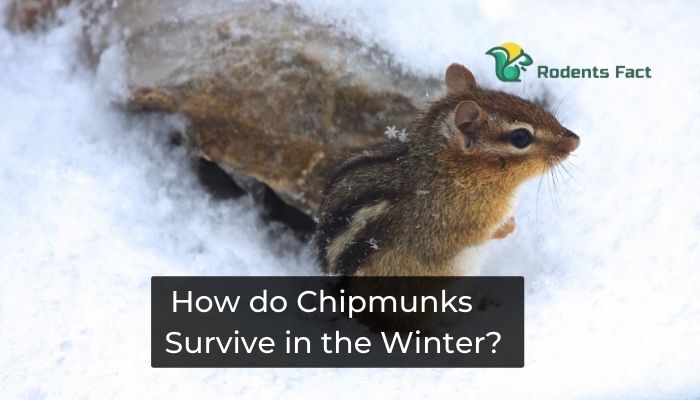
While the cold grasps the chipmunks, the insufficiency of food can starve them to death too. But they have their own tactics to survive the winter- we call them smart for a reason! So, how do chipmunks survive the winter and feed themselves despite the weather, check it out!
Winter and the Survival of Chipmunks
Chipmunks are rodents and we know a fact about most rodents- they hibernate. However, do chipmunks hibernate? Yes, this squirrel family hibernates. They go underground to safeguard themselves in the winter.
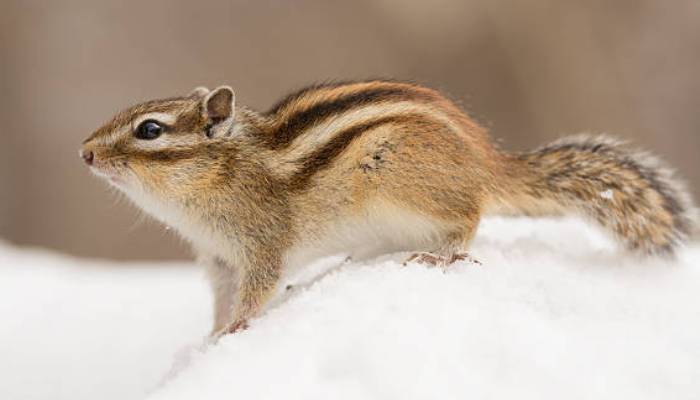
But if we look closely, we will know that these rodents are not true hibernators. Instead of true hibernation, they enter into states of torpor where they don’t hibernate the entire time, only some of it.
How Chipmunks Survive Winter
Unlike mammals, it gets tough for the animals to survive the winter. The same goes for the chipmunks. As they live in the colder areas, living and especially feeding themselves gets tougher.
In this state, such animals decide to hibernate. But as we have mentioned above, chipmunks don’t hibernate like the groundhogs. They enter states of torpor for their survival.
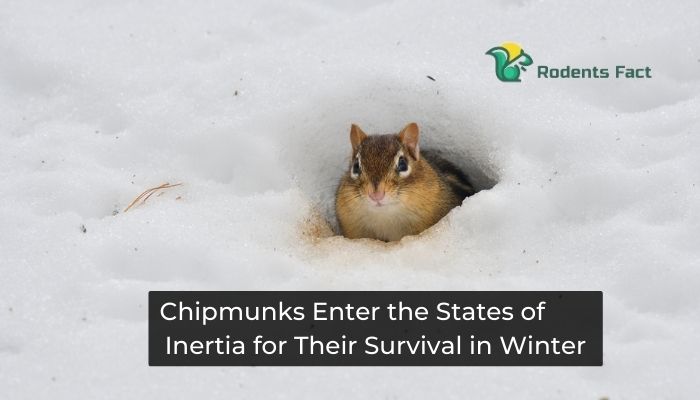
But where do chipmunks sleep in the winter? We all know chipmunks are underground masters. Once again, they live underground both in all seasons. During winter, instead of facing the cold weather, they retreat underground.
And this is where they spend their winter. In summer they might create their underground burrows at the upper level of the ground. But in winter, the scenario changes; they build their burrows far deeper in the ground.
🐿️ Read More: How To Catch A Chipmunk | 3 Proven Ways
As the upper level stays colder, they prefer the deeper levels. These stay warmer than the surface and they don’t freeze during their deep sleep. If you want to know more about how they live, check out “where do chipmunks nest!”
The Mild-Hibernation of Chipmunks
But why is a chipmunk not a true hibernator? Well, the fact can be cleared first that they hibernate. But their hibernation method is not like that of other rodents. During their hibernation, they can wake up too.
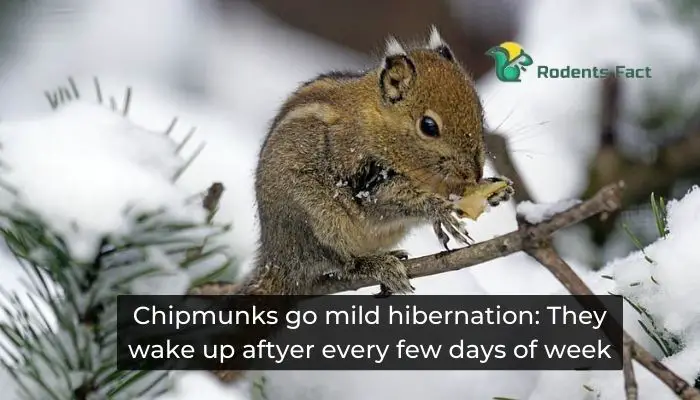
Yes, after every few days, the chipmunks wake up from their sleep. The reason behind their waking up is food. Along with food, they also need to wake up for defecating. We can address it as mild-hibernation or half-hibernation.
During the hibernation or mild-hibernation period, they go through physiological changes. And this is what helps them to deal with the cold climate. When winter comes, they go underground. And there, the body of the chipmunks enters a state of sleep or torpor.
Respiration Rate during winter
In this process, the heart rate of these animals lessens. According to studies, the respiration rate is also gets reduced to a lower number. This is quite interesting that even after a good deal of reduction in their respiratory rate and heart rate, they survive.
The standard respiration rate of a chipmunk is 60 breaths every minute. But when it is cold and they enter their torpor, the rate reduces to 20 breaths every minute.
🐿️ Read More: Can You Have A Chipmunk As A Pet? | Facts To Consider
Body Temperature during winter
Besides the respiration rate, a good deal of changes is seen in their body temperature. Just like the previous rate, the body temperature falls too. The standard body temperature of a chipmunk is 100 degrees Fahrenheit.
However, when the weather is too cold during their sleep, the temperature can fall to 40 degrees Fahrenheit or close. If we check the true hibernators and their body temperature, the chipmunk one is close to them.
So, they deserve the same credit as a true hibernator! However, when they wake up from their sleep, their body temperature rises. It goes up from 94 degrees Fahrenheit to 100 degrees Fahrenheit. You see, bears can stay in hibernation the entire winter.
But even during this period, chipmunks need to eat, defecate and urinate. This helps them to keep their cycles active and keeps their body active even when they sleep.
Chipmunks Winter Food
We have talked about how the body condition of a chipmunk works when it is winter and how they survive the situation. But to survive, they also need food! Then how do chipmunks prepare for winter food?
In the case of groundhogs, they are habituated to stuffing up their body with a lot of food for the entire winter. Most hibernating animals feed themselves a lot of food during the summer and autumn. And by eating a lot, they increase their body fat.
This fat works as stored energy for them. And when they enter their hibernation period, they simply use these fats to make their body work better. The worst part about a true hibernator is they can die during the hibernation!
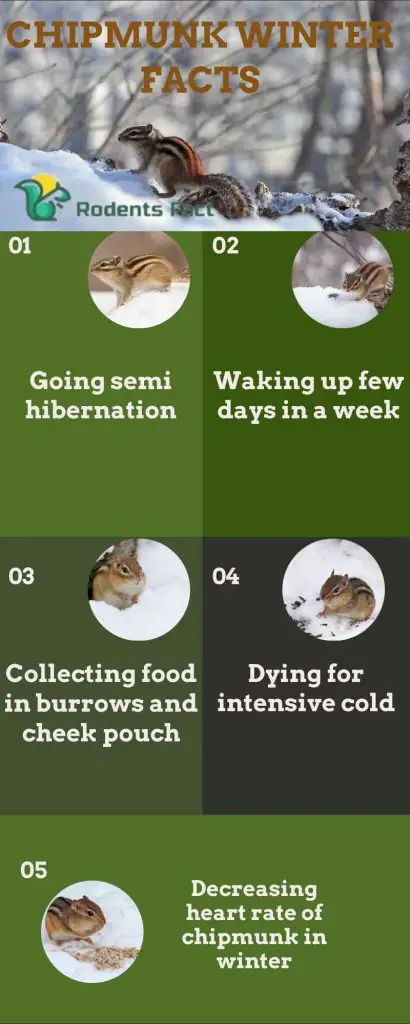
If the animal fails to stuff enough food for the entire winter, its body will stop working when they are hibernating. As a result, they will starve to death during this period. They won’t wake up at all! But the thing is not the same for the chipmunks.
They do not stuff themselves with food for the whole winter. These animals deal with the situation as a hoarder and do not fatten themselves up in the summer and autumn. Instead of eating a lot of food in the other seasons, they work hard for collecting food.
Yes, they do not store their food in their body- they store their food in their burrows. Just the way humans keep stored food in the fridge, they store their food in their burrows. These foods are kept in their burrows.
After collecting the food they need, they go to their mild-hibernation period. And there, they simply start sleeping. After a few days, they wake up and eat their food.
They empty their bowels and they again go back to sleep for the next few days. The hibernation process of chipmunks includes the breaks for eating.
Chipmunks Collecting Food for winter
But what do chipmunks eat in the winter that helps them last so long? Well, just the food they usually eat! They collect their regular food and pile them up for the winter in the other seasons. However, to keep themselves away from being weak, they settle for nuts and seeds as much as they can.
They also collect insects, berries, and fungi as their food. Nuts and seeds are the items that give them strength to survive and don’t let them starve to death during their hibernation.
Piling Food in the Burrows
In the case of collecting food, chipmunks are very smart. When it is winter, almost all the animals suffer a lot because of not having enough food. For a chipmunk, it’s necessary to safeguard their collected food from other animals and especially other chipmunks.
And so, they don’t only think about piling a lot of food, but they also go through some smart moves for selecting their locations. To ensure that they do not face a shortage of food, they work hard for creating a separate burrow.
🐿️ Read About Cute Guinea: What To Feed Guinea Pigs When Out Of Food | What’s Safe?
This specific burrow is their emergency burrow. They pile up their emergency food in this particular burrow. So, in short, they have two places where they collect their food. Firstly, they collect and pile up their food in the burrow they live, and then for emergencies, they collect some food and keep them in the emergency burrow.
And the best part is, some chipmunks are way smarter than their times! So they plan on keeping themselves safe. To safeguard their food, they don’t rely on one emergency burrow. They build multiple emergency burrows.
And this is what makes them survive their winter! And this is why they can live a long life. Take a look at how long chipmunks live to know their average lifespan and beyond!
Collecting Food in Cheek Pouches
By now, we already know that they are good hoarders. But how do they collect so much food? Well, it’s because of their internal cheek pouches! With these cheek pouches, they gather a particular amount of food and carry them to their burrows.
But when they sleep during winter, these cheek pouches work as great storage. They plan on filling up their cheek pouches with necessary food before they go to their mild-hibernation period. This is their second stage of emergency storage!
When the food of the burrow and the emergency burrows finish or any other animal invades there- they use the food they have collected in their cheek pouches for emergency storage!
Death during winter
Chipmunks are smart, we have repeated a lot of times. When you are after this little animal, it can play dead. Along with this, it can climb too! When it is winter and you see a chipmunk hibernating, you might think that it is dead but it is not. But can chipmunks freeze to death?
Well, if the rodent is forced to endure the cold temperature, it might freeze to death. Then again, this is why they go to torpor so that they can safeguard themselves from dying in the cold, right?
As they dig far underground, too much cold cannot enter their rooms. As a result, they stay safer and warmer than the surface level.
Wrap Up
Though chipmunks are small animals, they have their ways to fight the climate and survive. And this is why they have lived for ages and animals like dinosaurs were wiped out.
Surviving requires a lot of improvising; it is combat. And chipmunks are smart enough to deal with what nature throws at them!





